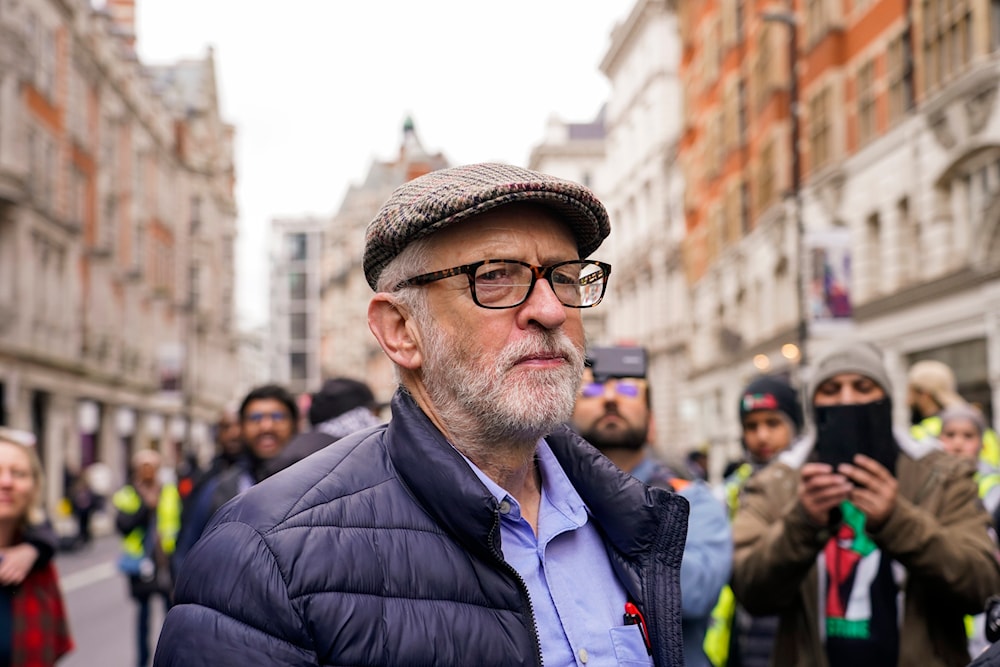Corbyn’s Gaza inquiry blocked, tribunal now considered
As UK ministers dismiss calls for an official inquiry, critics warn that a lack of transparency over weapons exports and military agreements risks shielding potential violations of international law.
-

Former Labour Party leader Jeremy Corbyn attends a demonstration in support of the Palestinian people in Gaza, in London, Saturday, Feb. 17, 2024 (AP)
Amid growing public concern over the UK’s role in the Israeli genocide in Gaza, critics and human rights groups are weighing the formation of an independent tribunal to investigate possible UK complicity in violations of international humanitarian law.
The move comes ahead of a scheduled debate in the House of Commons on a bill introduced by the ex-Labour leader Jeremy Corbyn, which calls for an official inquiry into UK actions linked to the ongoing genocide. However, the bill is expected to be blocked by government whips on Friday, leaving Corbyn and his allies with few institutional avenues.
“There has been no real scrutiny of the UK’s role in what is, by all accounts, a genocide by the Israel Defense Forces,” said Corbyn, MP for Islington North, who argues that Parliament has failed to address the issue beyond brief ministerial responses.
NGO coalition demands transparency on UK-'Israel' ties
A coalition of 22 non-governmental organizations, led by Action Aid, has backed the call for a formal investigation. In a statement, the coalition pointed to credible reports of atrocities in Gaza and warned of possible UK complicity through economic and military cooperation with the Israeli entity since October 2023.
“It is increasingly urgent to determine whether the UK has contributed to violations of international law through the sale, supply, or use of weapons, surveillance aircraft, and RAF bases,” the coalition wrote.
The proposed inquiry would also scrutinize the UK government’s interactions with Lockheed Martin, the US defense contractor behind the F-35 fighter jet program, to assess whether UK-manufactured components have been used in Gaza bombings.
These issues were debated in part during a 20-month legal challenge recently dismissed by UK courts.
Legal challenge reveals opaque arms oversight
The now-dismissed case had sought to halt the UK’s participation in the F-35 global spares pool, from which components are believed to be routed to Israeli forces. Although unsuccessful, the legal battle exposed the secrecy surrounding UK arms export oversight, as many details were debated in closed court sessions, inaccessible even to some legal representatives.
In a written statement, Defense Minister Maria Eagle claimed that if the UK were to withdraw from the F-35 supply chain, it would also jeopardize the operational capacity of the RAF’s own F-35 fleet.
The Foreign Office, for its part, revealed it had subcontracted the analysis of 412 Israeli military operations in Gaza to external parties. Yet, Middle East Minister Hamish Falconer admitted that the UK had been unable to determine whether those operations complied with international humanitarian law, citing “insufficient verifiable evidence.”
“We have not been able to reach a determination in relation to the conduct of hostilities,” Falconer told MPs.
RAF flights and classified cooperation agreements
Corbyn has also raised concerns about the lack of transparency surrounding 538 Royal Air Force flights conducted from RAF Akrotiri in Cyprus over the eastern Mediterranean since October 2023. While the Ministry of Defense insists the missions were unarmed and focused on hostage rescue, Corbyn has questioned their broader strategic role.
He is also pressing for the public release of a 2020 UK-"Israel" military cooperation agreement, which remains classified. The Ministry of Defense has acknowledged the agreement includes “defense education and engagement activity” but refused to publish it, citing its higher security classification.
Independent tribunal gaining traction
With government opposition expected to stall Corbyn’s bill in Parliament, campaigners are increasingly considering an independent public tribunal as an alternative route to establish accountability.
Supporters argue such a tribunal could provide an impartial, fact-based assessment of the UK’s military and diplomatic conduct during the war, especially given widespread concerns about arms transfers, intelligence cooperation, and the use of British military infrastructure in the context of Israeli atrocities in Gaza.
Read next: UK's Jeremy Corbyn hints at leftist rival to Labour Party

 4 Min Read
4 Min Read










